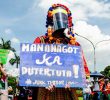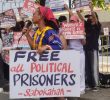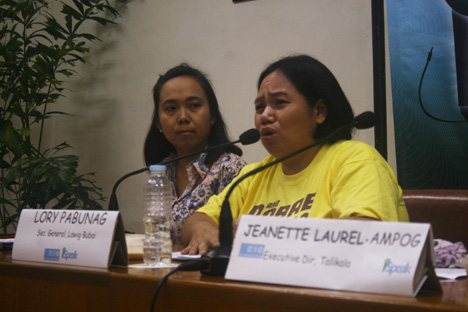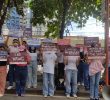When a country fails in its obligation to protect the lives of human rights defenders but is elected to such a prestigious UN body, it dishonors the UN as an institution and makes a mockery of its ability to promote and protect human rights, according to the Hongkong-based Asian Human Rights Commission.
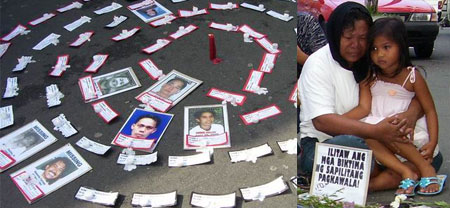
Families of victims of forced disappearances hold a candle-lighting ceremony at the Baclaran church on All Souls’ Day. (Photos courtesy of Arkibong Bayan.)
On November 3, the media reported that the Philippines has been elected to a seat on the Economic and Social Council (ECOSOC), one of the main organs of the United Nations (UN). Ambassador Lauro Baja Jr., permanent representative of the Philippines to the UN, quickly praised the overwhelming number of votes received by the Philippines � 188 out of 192 votes cast � as it �mirrors the excellent standing of the Philippines in the United Nations.�
This is yet another UN post the Philippines has attained this year following its election to the Human Rights Council in May.
While the government, in particular the Philippine mission in New York, may have reason to celebrate this �victory,� the victims of human rights violations and their families in the Philippines must feel otherwise, for the government�s election to the UN bodies neither changes nor exonerates its bleak human rights record at home.
 What is there to celebrate, for instance, if those serving the poor in the Philippines are being killed and harassed almost daily? What �excellent standing� is there if the government cannot protect activists seeking genuine land reform, decent wages and humane working conditions for the Filipino people, and if those defending urban settlers from illegal and violent demolitions and workers� rights feel that their lives are threatened? Based on this record, what credibility can the Philippine government have on the new UN body to which it has just been elected?
What is there to celebrate, for instance, if those serving the poor in the Philippines are being killed and harassed almost daily? What �excellent standing� is there if the government cannot protect activists seeking genuine land reform, decent wages and humane working conditions for the Filipino people, and if those defending urban settlers from illegal and violent demolitions and workers� rights feel that their lives are threatened? Based on this record, what credibility can the Philippine government have on the new UN body to which it has just been elected?
As this statement is being written, another peasant activist, Emerlito Dizon, was brutally killed in his house in Palawig, Zambales on November 2; and on October 30, a peasant activist seeking genuine land reform was wounded in a shooting in Balas, Iloilo. The latter shooting took place after the victim and his fellow villagers were attacked by armed thugs of an influential landlord who forced them to evacuate the disputed land they were occupying. These continuing attacks against peasant activists add to the increasing incidences of extrajudicial killings and violence in the country.
Violence against workers fighting for their rights is also excessive. The use of violence allegedly by Philippine Economic Zone Authority (PEZA) security forces continues, for example, against two labor unions inside the Cavite Export Processing Zone (CEPZ) in Rosario, Cavite since they went on strike on September 25. The strikers are merely seeking decent wages, improved benefits and better working conditions. They are trying to maintain their picket line to assert their right to strike. However, they are being denied access to their picket line, sanctioned with a food blockade, illegally dismissed from work and continually threatened with violent dispersals.
It is also in Cavite where labor leader Diosdado Fortuna (or �Ka Fort�) was fatally shot and killed in September 2005. In May this year, another labor leader, Gerardo Cristobal, survived an ambush allegedly by police officers. The violence against them, and all the hundreds of activists killed all over the country in recent times, are related to their struggle to serve the poor, to assert their own rights and to defend human rights. These are a fraction of the enormous number of examples of the government�s excessive failure in upholding people�s economic and social rights in the Philippines as well as their civil and political rights.
Among the critical functions of ECOSOC members, according to Baja, is to participate in policy reviews, policy dialogues and to make recommendations on issues of economic and social developments as well work toward the implementation of international development goals. What credibility though does the Philippine government have in performing these tasks given its bleak human rights record, including the protection of its people�s economic and social rights? Is it not essential that in order to perform this duty, ECOSOC members must respect and uphold the implementation of human rights recognized in international covenants and conventions?
While the government�s election to ECOSOC deserves strong opposition and condemnation, it also indicates the poor understanding, and perhaps even indifference, by UN member-states to the human rights records of those they select for such important positions in the UN and, in addition, the inability of the Filipino people to expose the government�s poor human rights record.
These developments indicate the need to create a stronger movement among the Filipino people and the international community to expose government atrocities, hoping that this awareness will influence the international community, in particular the UN, not to elect countries with poor human rights records to such important bodies.
In closing, the government�s election to ECOSOC must not be used to cover up and dismiss the Philippine government�s frequent and excessive violation of human rights, including the Filipino people�s economic and social rights. When a country that fails in its obligation to protect the lives of human rights defenders is elected to such a prestigious UN body, it dishonors the UN as an institution and makes a mockery of its ability to promote and protect human rights.
Moreover, it puts at further risk the lives of human rights defenders in the Philippines and shows a lack of respect for the country�s poor.
Extrajudicial Killings

